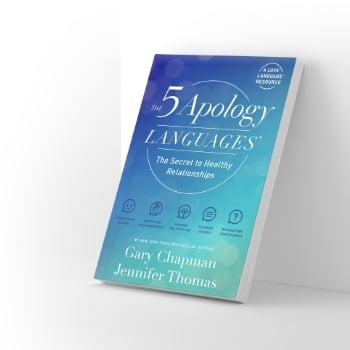Your Primary Apology Language™ is: Make Restitution
In our society, many people believe that wrong acts demand justice. The one who commits the crime should pay for their wrongdoing. A mate who speaks this love language feels the same way towards apologies. They believe that in order to be sincere, the person who is apologizing should justify their actions. The mate who’s been hurt simply wants to hear that their mate still loves them.
There are many effective ways to demonstrate sincerity in an apology. Each mate must learn the other’s love language in order to complete the act of restitution. Though some mates may feel as though all is forgotten with a bouquet of flowers, that may not necessarily work for all mates. Every mate should uncover what their partner’s main love language is (Words of Affirmation, Quality Time, Acts of Service, Physical Touch, and Receiving Gifts) and use that specific language in order to make restitution in the most effective way.
For a mate whose primary apology language is making restitutions, no matter how often you say “I’m sorry”, or “I was wrong”, your mate will never find the apology sincere. You must show strong efforts to make amends. A genuine apology will be accompanied by the assurance that you still love your mate and have a desire to right the wrong doings committed.
In some relationships, a mate wants to hear their partner physically ask for forgiveness. They want assurance that their mate recognizes the need for forgiveness. Asking for forgiveness shows that you realize you’ve done something wrong and that you are willing to put the future of the relationship in the hands of the offended mate.
Requesting forgiveness is not easy. It often leaves one vulnerable to rejection. Many people have a hard time seeking forgiveness because it means admitting that you have failed. The only way to overcome this fear is to recognize that it is very common amongst mankind. The commonality makes it okay to be a failure. It allows a stubborn mate to apologize to their partner and become a healthy individual.
Ultimately, it’s important to remember that there is a difference between asking for forgiveness and DEMANDING forgiveness. When we demand forgiveness, we tend to forget the nature of forgiveness. Forgiveness is a choice the offended party is supposed to make. Demanding forgiveness takes away the sincerity of asking for it.
Remember not to treat forgiveness lightly. It is something to be cherished and appreciated. The act of forgiveness is hard on both ends – for the person who’s asking and for the person who’s accepting.
It is very difficult for some people to admit that they’re wrong. It makes them doubt their self-worth, and no one likes to be portrayed as a failure. However, as adults, we must all admit that we make and will make mistakes. We are going to make poor decisions that hurt our mates, and we are going to have to admit that we were wrong. We must accept responsibility for our own failures. For many individuals, all they want is to hear the words, “I am wrong.” If the apology neglects to accept responsibility for their actions, many partners will not feel as though the apology was meaningful and sincere. Many partners need to learn how to overcome their ego, the desire to not be viewed as a failure, and simply admit that their actions were wrong. For a mate who speaks this apology language, if an apology does not admit fault, it is not worth hearing. Being sincere in your apology means allowing yourself to be weak and admitting that you make mistakes. Though this may be hard to do for some people, it makes a world of a difference to your partner who speaks this language.
For some individuals, planned change is the convincing factor in an apology. Some mates will doubt the sincerity of an apology if it is not accompanied by their partner's desire to modify their behavior to avoid the situation in the future. Admitting you are wrong creates vulnerability. It allows your mate to get a glimpse of your heart. The glimpse of true self is assurance that the apology was sincere.
One important aspect of planned change is verbalizing your desire to change. Your mate cannot read your mind. Though you may be trying to change inside, if you do not verbalize your desire to change to your mate, most likely they will still be hurt.
It is also important to make a dedicated plan for change. Often apologies involving change fail because the person never establishes steps of action to help ensure success. Taking baby steps towards change instead of insisting on changing all at once will increase your chances of successfully changing your ways.
It is important to remember that change is hard. Constructive change does not mean we will immediately be successful. There will be highs and lows on the road to change. You must remember that anyone can change their ways if they are truly and genuinely ready to change.
The “Expressing Regret” Apology Language speaks most clearly when the person offering the apology reflects sincerity not only verbally, but also through body language. Unflinching eye contact and a gentle, but firm touch are two ways that body language can underscore sincerity.
Next steps to improve your relationship.
NOTE: Though every effort has been made to create a useful assessment tool for the end user, the authors and publishers make no warranties, express or implied, regarding the accuracy, completeness, timeliness, or usefulness of any information contained or referenced therein. This assessment is not to be used as a substitute for any medical or psychological advice, diagnosis, or treatment of any condition or problem. Users should direct all questions regarding these matters to a licensed clinician. The use of this assessment does not create an express or implied professional relationship. Any actions taken as a result of using this assessment are at the sole discretion of the user, and the author and publishers are not or will not be liable or otherwise responsible for any decision made or any action taken due to the use of this assessment.

